Graham Reid | | 16 min read
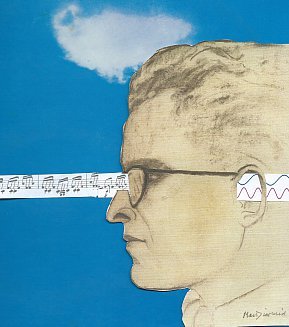
Unlike pop and rock musicians, classical composers can't -- or don't - rely on lyrics ("pie cart rock'n'roll", "goin' down to Otaki") to convey a sense of place or mood.
Classical composers (mostly) use pure music for an emotional effect to evoke land, sea, sky and moods. So they think in a different (instrumental) way.
Douglas Lilburn (1915-2001) was not just the first major New Zealand classical composer, he was the first to study overseas and also sought to established a distinctive "New Zealandness" in his sound . . . and became the godfather to numerous other New Zealand composers who studied under him or followed his example.
Lilburn was born in Wanganui in 1915 and grew up on the family farm at nearby Drysdale. He was the seventh child in the family.
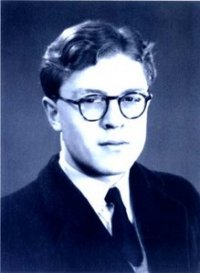
"I was not born into a musical family, and had no proper musical training before the late age of 17. But rather than regret this, I've always remained grateful for a childhood on a central North Island sheep station, a richly varied and potent human and natural context to shape a young imaination."
He went to school in Wanganui (the family moved from the farm a number of times) and his mother said he should only play with "nice children".
The problem was that "she hadn't met any since her arrival in Wanganui, and neither had I".
He was often deprived of company amd was something of a loner . . . and reflective.
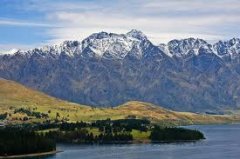 Had piano lesons at school, went to a boarding school in the South Island near Oamaru, played piano in the school orchestra but mostly kept a low profile.
Had piano lesons at school, went to a boarding school in the South Island near Oamaru, played piano in the school orchestra but mostly kept a low profile.
In private he wrote a 12 minute piano sonata (at about age 16)
He was much attracted by the natural beauty of the South Island.
University in Christchurch 1934-36
Christchurch at the time had a vibrant cultural life with aspiring and published poets, writers, artists and printers. (Among them artist and designer Leo Bensemann, and poets Denis Glover and Allen Curnow.)
Enrolled for journalism (it seemed more practical to his father) but in the second and third years moved over to music.
Seems likely to have had homosexual experiences at school and although later had a brief relationship with painter Rita Angus (she later told him she hoped to "release the music" in him) but he was a man whose sexual life was outside the norm at the time. And illegal.
While at university in 1935, the Australian composer/arreanger Percy Grainger toured New Zealand and offered a cash prize in a composition competition for the best work exhibiting "typical New Zealand cultural and emotional characteristics".
Lilburn entered and wrote Forest. He won. He was 21. And he had never previously written a piece for orchestra.
Forest
To London
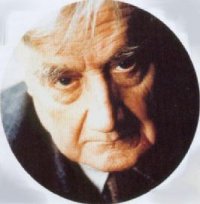 Using the money from the prize but mostly with assistance from his parents, Lilburn went to Londom to the Royal College of Music (hopefully to study under Ralph Vaughan Williams, right, whom he admired).
Using the money from the prize but mostly with assistance from his parents, Lilburn went to Londom to the Royal College of Music (hopefully to study under Ralph Vaughan Williams, right, whom he admired).
Englishman Williams and Finland's Sibelius (both nationalists, interested in folk music and their own traditions) were major influences on the young Lilburn.
In 1937 he wrote the Drysdale Overture (named for where he grew up) which was his first major work (dedicated to his father) and in it you can hear a nostalgic and dramatic emotional reflection on the place he knew as home.
Success in London . . . of a kind.
While in England, Lilburn won three major scholarships and his Festival Overture was premiere by the Royal College of Music Orchestra.
But these didn't make much a ripple in Britain. However in 1940 it was the centenary of the signing of the Treaty of Waitangi in New Zealand and a commission was offered for an orchestral work to commemorate the occasion.
Lilburn wrote his Aotearoa Overture which was performed in London that same year (there are no British reviews of the concert which included kapa haka) and the work wasn't performed in New Zealand until 1959. But it was his major work to that time and its opening passages are memorable.
The Return
In 1940 Lilburn returned to New Zealand and had in mind to find a distinctive New Zealand style of musical expression.
"I think that attitude probably came from the early days as a student at Canterbury when I realised that what some of the poets were doing showed an awareness of this country which i found very exciting . . . one had to learn that one lived with the bush and not with woods".
That year he wins first and second prize in the Centennial Music competitons with the Drysdale and Festival Overtures, and first prize in the choral competion with Prodigal Country.
But . . .
That counted for very little in a country at war and so he went to his sister's farm at Taihape as a labourer (but still writing).
Short term contract with the National Broadcasting Service in Wellington for a couple of months in 1941 . . . then back to Christchurch to teach and compose.
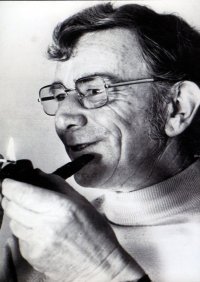
And!
Landfall in Unknown Seas, a poem commissioned from poet/writer Allen Curnow (pictured) to commemorate the 300 years since Abel Tasman had sighted New Zealand (and given the land its name).
Lilburn added the evocative musical interpolations between Curnow's words.
Again, he is there for the emerging idea of nationhood, and the uniqueness of this country with a history and sensibility of its own.
"Simply by sailing in a new direction, you could enlarge the world . . ."
These opening words could be read as a metaphor for the emerging new sense of culture and New Zealand's uniqueness which artists of all kinds started to explore. We were not a little England. We had our own history and these historical commemorations signaled that.
And more . . .
There followed numerous works for strings, voice, piano, orchestra, symphonic works . . .
From the Port Hills (1942), a reference to the hills outside Christchurch
From the Port Hills 1942
His Symphony No 1 which was premiered in 1951 was the first symphony by a New Zealand composer, Symphony No 2 written at the same time (but not premiered until 1959) evokes the landscape but in one section alludes to the shouts by the Wellington Post's paper boys.
Symphony No 2, second movement
The late 40s to the mid 50s.
Lecturing at the Music Department at Victoria University (Wellington) and in '46 at Cambridge he was invited to give a talk (A Search for Tradition) at the first summer music school.
" . . . the pattern of our landscape and sea coasts, the changing of our seasons and the flow of light and colour about us, that all these things show patterns of movement and characteristic rhythms. And these things in a subtle way affect our manner of living and I believe that they impress themselves on our minds in a way that will ultimately give rise to forms of musical expression."
In '52 a composers group was established at Cambridge and among those in it were Edwin Carr, Dorothea Franchi, Larry Pruden and David Farquhar whom Lilburn tutored . . . and went on to become the next generation of New Zealand composers.
But in '55 -- after being in New Zealand for 15 years and feeling he needed to reconnect with what was happening internationally -- he left for the US and Britain.
1956, a turning point and Lilburn's second stylistic period
While in the US and Britain he encountered a whole new compositional method (12-tone or serialism) and an avant-garde style which he had been unaware of.
"I realised how acutely provincial and inadequate my musical knowledge and compositional technique were in the face of the new musical context I found there . . ."
And as he said later, he "simply wasn't interested in a lot of the things that the symphonic technique can do -- the development of material -- it just seemed a played out game. I got the impression I was becoming pretty old-fashioned through being isolated [in New Zealand] for so long."
Influenced by the Austrian Arnold Schoenberg (1874-1951) who was associated with the Expressionist movement and who developed the 12-tone technique (briefly all 12 notes of the chromatic scale are of equal value) . . . and by his pupils Anton Webern and Alban Berg, Lilburn began to experiment with this new musical system on his return to New Zealand in '56.
His first piece using this new idea was A Birthday Offering, a commission by the NZ Broadcasting Service to commemorate the 10th anniversary of the founding of the National Orchestra. Reviews of the concert where it was first played were mixed.
It was played twice more then put aside for 18 years.
A Birthday Offering 1956
1956-65
Explored serialism (concentrating on short motifs rather than the grand sweep of his earlier orchestral work) and "was mainly a few jump ahead of my audience".
Taught, fought for the rights of composers' interests through the Copyright Act 1962, with fellow composer Ashley Heenan established the APRA Music Advisory Committee (Australasian Performing Rights Association) . . .
His Symphony No 3 in '62 again divided critics but he was the country's most pre-eminent composer and enormously influential through his work and teaching.
The major change
But then there was "the zombie on the horizon" (electronic music) and he was excited because "I can, for the first time, enter into and explore my own total heritage of sound, meaning all sounds, not just narrow segments of them that we've long regarded as music. Meaning that now I can take for a starting point many of the natural sounds that have been in my ears since childhood, and use these as I would conventional musical materials."
He was almost 50 when he left New Zealand in '63 to travel to Hawaii, New York, Paris and England where he visited electronic studios, such as the BBC Radiophonic Studio in London, famous for producing the theme to the original Dr Who television series.
1965 - 80 His Third Style Period
Returning from his sabbatical, he established the first electronic music studio in New Zealand at Victoria University and within three weeks of his return submitted a piece for a competition.
It was The Return, a 17 minute piece with a poem by Alistair Campbell and which utilised white noise (for mist), field recordings of the sea played at half speed, taped bird song slowed down . . .
A highly experimental sonic piece.
The Return 1965 (extract only)
and he had to submit a score. this is it.
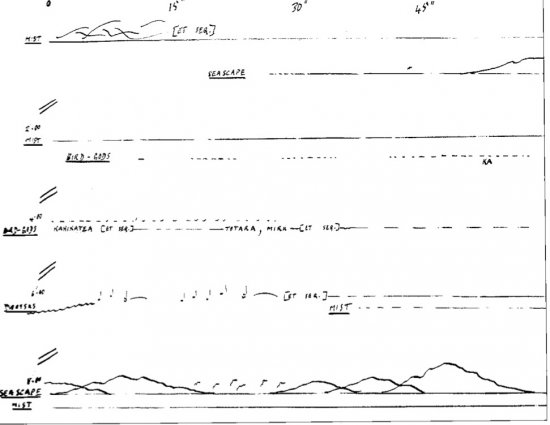
.
A sample of Lilburn's electronic works
Poem in Time of War 1967 (extract only)
And more
Triptych 1977 (extract only)
Soundscape with Lake and River, 1979 (extract only)
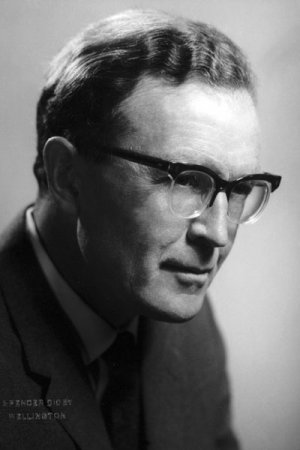 Soundscape was written just before he retired in 1980.
Soundscape was written just before he retired in 1980.
"I think the last piece I did [Soundscape] really brought me full circle to what I'd been wanting to do all the time -- take the natural sound of the river and lake at Taupo and weave it into the texture of electronic sound and fuse them some way".
Other activities by Lilburn in his final decades . . .
He worked with Wai-te-ata Press (poetry and essays publishers) to establish a music edition publishing scores by the likes of Jenny McLeod, Larry Pruden, David Farquhar and others (most of whom had been his students), assisted former students in recording, watched Coronation Street (true, a big fan), established the Lilburn Trust and was on the Music Advisory Committee of the Alexander Turnbull Library in Wellington etc.
On his death there were tributes from politicians, poets, writers and many, many musicians.
He left a legacy not just in establishing a musical tradition of New Zealand composers responding to this country, but also in the politics of music (publishing, printing of scores, royalties to composers etc).
For more on Lilburn's electronic work see here.
.
THE MUSICAL LEGACY OF LILBURN
Lilburn tutored many young composers, among them . . .
.
David Farquhar (1928 - 2007)
Born in Cambridge. Spent most of his early years in Fiji. University in Christchurch before completing his degree at Victoria University in Wellington where he studied with Douglas Lilburn.
 To Britain, completed MA at Cambridge, studied composition at Guildhall School of Music, London.
To Britain, completed MA at Cambridge, studied composition at Guildhall School of Music, London.
Back to New Zealand, joined Department of Music at Victoria University, made Professor of Music in '76, retired '93. Founder-President of the Composers’ Association of New Zealand (CANZ) in '74, from '82 – '95 member of the Board of the New Zealand Composers’ Foundation and Trustee of the Centre for New Zealand Music.
In 2004 made a Companion of the New Zealand Order of Merit for his services to music. Wrote numerous orchestral, choral, stage and instrumental works, songs and music for children, Recognised since the 50s as at the forefront of New Zealand composition.
From Ring Around the Moon (tango section) originally 1954, this version 1975
David Farquhar: Epithalamion 1954 (extract only, some surface noise)
.
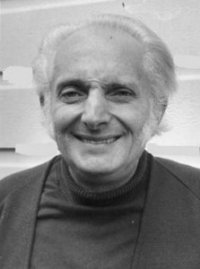 Larry Pruden (1925 - 82)
Larry Pruden (1925 - 82)
Born New Plymouth and brought up there. Began learning the piano at 8, became church organist at 13, joined the music staff of New Plymouth Boy’s High School in 1940 as piano teacher. His first known composition dates from 1938; at this stage his musical mentor was the well-known blind organist and composer Joseph Papaesch, his uncle. Apart from contact with Douglas Lilburn at Cambridge Music Schools from 1947, he was self-taught in composition until granted a bursary for study in England.
In London from 1951-54, attended Guildhall School of Music and Drama, where he studied composition, conducting and percussion. 1952 joined Benjamin Frankel’s composition class which also contained David Farquhar and Edwin Carr. Returning to New Zealand, settled in Wellington in 1955, employed in various capacities by NZ Broadcasting until '75. Went to Dunedin as Mozart Fellow at Otago University. Involved in tutoring composition at summer music schools, conducting, writing programme notes and introducing radio programmes. From '77 freelanced as composer and conductor in Wellington until his death.
String Trio 1954 (Overture only)
Harbour Nocturne 1955
.
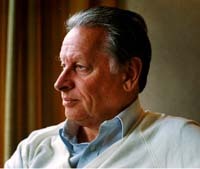 Edwin Carr (1926 - 2003)
Edwin Carr (1926 - 2003)
Born Auckland, educated Otago Boys’ High School to '43, studied music at Otago University 1944-5 and Auckland University College '46, degree unfinished. Attended the first Cambridge Summer Music School '46, with Douglas Lilburn as composition tutor. Travelled to England 1948, New Zealand Government Bursary to study composition at the Guildhall with Benjamin Frankel: much freelance work and travel. 1954 a British Council scholarship enabled him to study under Petrassi in Rome, worked in Italy as musical director of an independent ballet company. In 1957 a further British Council Scholarship enabled him to study with Carl Orff in Munich.
Travelled back to New Zealand in '58, staying until '60 teaching and composing. During 60s spent time in both Australia and England, composing, teaching and studying, several trips to New Zealand.
From 1963 which was filmed in '71 when the NZ Ballet Company presented a production of it.
The Snow Maiden, Act 2 (played by the NZSO)
Awarded Mozart Fellowship at University of Otago '73-4. In '75-76 teacher of composition at the Sydney Conservatorium, '76 return to London. Return to Australia '77, part-time teaching at Sydney Conservatorium, '84 return to NZ, freelance composing and conducting based in Taupo, '91 shift to Waiheke Island, remained active as a composer. In '99 made a Member of the New Zealand Order of Merit in the Queen’s Birthday Honours. Died at his home on Waiheke Island.
.
AND THE "SECOND GENERATION" COMPOSERS
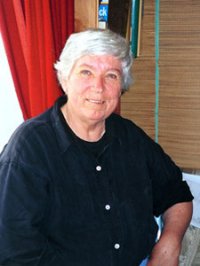 Jenny McLeod (1941 - )
Jenny McLeod (1941 - )
Born Wellington, grew up in Timaru and Levin. Throughout childhood and adolescence always involved in music, as school pianist, church organist, accompanist, or playing at dances in a band with her brothers. Enrolled Victoria University '61, studying music with Frederick Page, David Farquhar and Douglas Lilburn.
To Paris to study with Messiaen who made a lasting impression on her, moved to study with Boulez in Basel, then with Stockhausen and Berio in Cologne, where she wrote For Seven ('66) which attracted critical attention with performances by Stockhausen’s ensemble.
While in Cologne discovered Richard Taylor’s translation of the Maori creation poetry.
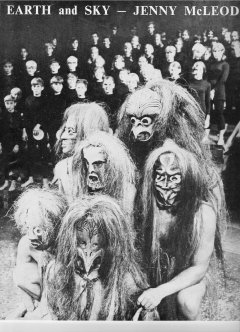 Returned to Wellington lecturing at Victoria University, commenced work on Earth and Sky, a large work of music-theatre for performance by school children, based on this poetry. First performed 1970.
Returned to Wellington lecturing at Victoria University, commenced work on Earth and Sky, a large work of music-theatre for performance by school children, based on this poetry. First performed 1970.
The extended work -- also a performance piece -- utilised three large choirs, smaller choirs, spoken word to convey the narrative, solo singers and multiple instruments to tell the Maori creation story of Tane, Tangaroa, Papa, Maui and so on.
The work made a significant contribution to the nation’s burgeoning bi-culturalism, and established McLeod at the rising star of New Zealand music.
Earth and Sky (extract only)
In '71 she was appointed Professor at Victoria University, remarkable on two counts – as a woman and as being just 29. Under the Sun not as successful as Earth and Sky but was a new direction in her music, it incorporated a rock band. Became convinced rock music, as well as non-Western music, had qualities lacking in Western art music.
Began to read Hindu and Buddhist philosophy, joined Divine Light Mission '75, focused on “devotional rock music” for bands. Resigned from University in '76, worked as a volunteer for Divine Light Mission in Auckland, Australia, and US. Disillusioned, returned to New Zealand in '81.
Commission from Bach Choir of Wellington to write Childhood ('81) using her own poems. Many commissions followed, integrated of language of popular music to reveal its “classicism”. By '87 felt reached the limit of what this stylistic synthesis was capable. Invited to contemporary music festival in Kentucky, met Dutch composer Peter Schat who introduced her to his “Tone Clock” theory. McLeod fascinated with this new systematic classification of triads, and immersed herself in a study of its theory and applications.
In '93 new direction set by He Iwi Kotahi Tatou for Maori and Pakeha choirs, the beginning of a close association with Maori culture. Became a member of Ngati Rangi, and regularly wrote hymns for Maori churches.
Considered one of the most naturally gifted of all New Zealand composers, career remarkable procession of extraordinary changes of direction.
Little Symphony 1963 (first movement)
.
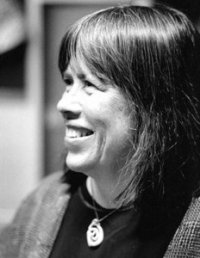 Dame Gillian Whitehead (1941 - )
Dame Gillian Whitehead (1941 - )
Born Hamilton, studied University of Auckland from '59-62, and Victoria University in '63, graduating BMus Hons in '64. Studied composition in Sydney, graduating MMus in '66. Attended composition course by Peter Maxwell Davies in Adelaide, '67 to England to continue studying with him. Worked in London composing and copying music, then in Portugal and Italy '69-70.
Freelance composing, principally in UK, '78-80 Composer in Residence at Newcastle University (UK), '81 returned to Australia at Composition School at the Sydney Conservatorium of Music, four years Head of Composition, early retirement in '96. In '99 her opera, Outrageous Fortune, won the SOUNZ Contemporary Award and she was honoured with membership of the NZ Order of Merit.
Hineraukatauri
A composition for taonga puoro (played by Richard Nunns) and Alexa Still (flute)
In 2000 one of the inaugural Artist Laureates of the NZ Arts Foundation, 2000 and '01 Composer in Residence at the Auckland Philharmonia, from '98-2003 President of the Composers’ Association of New Zealand.
Whitehead has written a wide range of music including works for solo, chamber, choral, orchestral and operatic forces, most of them direct commissions from performers and funding organisations.
In '08 she became a Distinguished Companion of the New Zealand Order of Merit, one of New Zealand’s highest honours, and she was granted the title ‘Dame’ in '09.
.
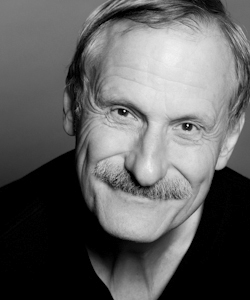
Jack Body (1944 - 2015)
Studied at Auckland University (1963-67). With a QEII Arts Council grant he attended the Ferien Kurse fur Neue Musik, Cologne and Institute of Sonology, Utrecht, Netherlands (1969/70). For two years (1976-77) he was a guest lecturer at the Akademi Musik Indonesia, Yogyakarta and since 1980 he has lectured at the School of Music, Victoria University of Wellington.
His music covers almost all genres, including solo and chamber music, orchestral music, music-theatre, music for dance and film as well as electroacoustic music. A fascination with the music and cultures of Asia, particularly Indonesia, has been a strong influence on his music. His ethnomusicological recordings include Music for Sale: Street Musicians of Yogyakarta recorded in 1976-87 on the streets of Yogyakarta.
Impenku Dek Bengi Kae ("my dream the other night")
[The singer is a girl from a village, aged about 16, and she is playing a homemade instrument of three thick rubber bands stretched over an open wooden box. She plucked the strings and tapped the box while she sang.]
He has been commissioned by the Auckland Philharmonia, the NZ String Quartet, the NZ Symphony Orchestra, the BBC Scottish Orchestra, and many other groups, and has written three works for the Kronos Quartet. His opera “Alley”, based on the life of Rewi Alley was premiered to wide acclaim at the 1998 NZ International Festival of the Arts. In 2003 he was a featured composer at the Other Minds Festival in San Francisco, and in 2004 he was honoured by a Composer Portrait concert in the NZ International Festival. He has been a featured composer of the Atlas Ensemble (2004 Holland Festival), and the Encuentros International Festival in Buenos Aires (2004), New music Works, Santa Cruz, USA (2005), and the Neue Musik aus Neuseeland, Lubeck (2006).
In 1999 he was awarded an OMNZ for his services to music, to education and to photography, and in 2004 he was honoured by the Arts Foundation of NZ as a laureate, an award that included a cash prize of $50,000.
Jack Body has been a passionate advocate for NZ music, beginning with the early Sonic Circus in Wellington in the 1960s, up to New Music New Zealand at the Ijsbreker in Amsterdam in 2001. In May 2005 he curated two concerts of NZ music in the Aboretum of New Zealand flora at the University of California, Santa Cruz. He has organised three Asia Pacific Festivals in New Zealand (1984, 1992, 2007) featuring the contemporary and traditional music of New Zealand and her Asian neighbours.
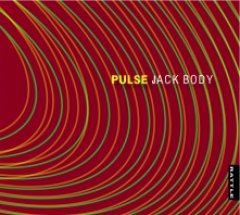 He has been the editor of Wai-te-ata Music Press since 1980, publishing scores of New Zealand music, and has also produced over eighteen CDs of music by New Zealand composers.
He has been the editor of Wai-te-ata Music Press since 1980, publishing scores of New Zealand music, and has also produced over eighteen CDs of music by New Zealand composers.
His double CD Pulse in 2001 was one disc of songs and tunes collected around the world and the other disc of the pieces transcribed into Western notation and played by the NZSO, NZ String Quartet with guest players.
This is Long-Ge taken from an old record by a Chinese musician Jiha Yueyue playing a Jew's (or jaw) harp.
Long-Ge
and this is it played by the NZ String Quartet
Transcription of Long-Ge
For an archived interview with Jack Body go here.

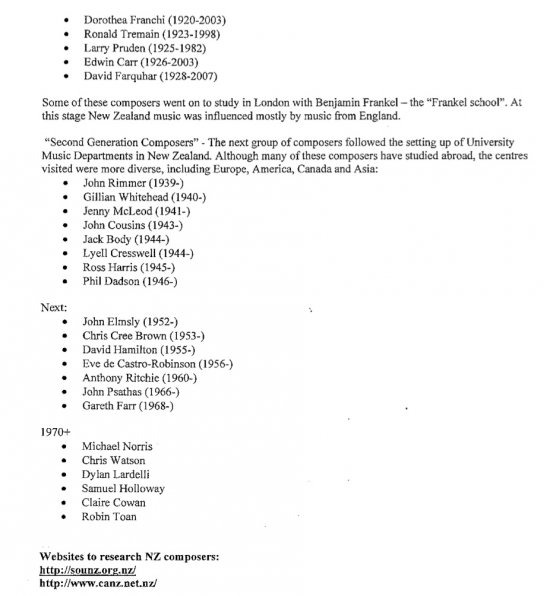
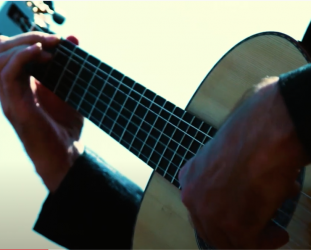
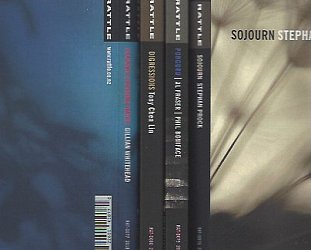

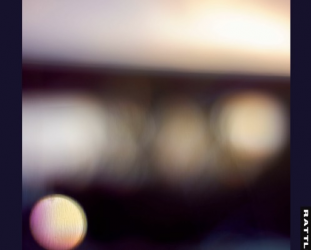
post a comment